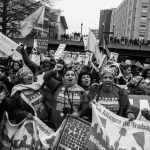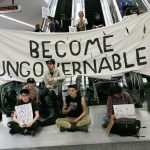
Back in Black
Only a concrete analysis of our concrete situation can determine what role, if any, the black bloc can play in today’s movements.

Only a concrete analysis of our concrete situation can determine what role, if any, the black bloc can play in today’s movements.

This original encounter of linguistic difference, of unintelligibility and non-translatability, seems to have had a lasting impact on the long, slow, violent, and modern histories of human suffering mentioned above. In a sense, poetry and politics after Auschwitz must be barbaric—that is to say, they must be foreign to the hegemonic language and culture that produced the Holocaust.

The kind of feminism we seek is already emerging internationally, in struggles across the globe: from the women’s strike in Poland against the abortion ban to the women’s strikes and marches in Latin America against male violence; from the massive women’s demonstration of the last November in Italy to the protests and the women’s strike in defense of reproductive rights in South Korea and Ireland.

The large crowd of demonstrators at San Francisco International Airport was diverse, a global array of nationalities, ages, and dispositions. They shouted loudly, against Trump and his Muslim ban, that refugees are welcome here.

Our collective child care was more than a practical matter, and more than just a belief that “the children are our future.” We saw social reproduction, “women’s work,” as the work that knits human communities together. We wanted all of our members to participate in work that we saw as crucial to building revolutionary consciousness and making revolution.

Recent workers’ struggles in India prompt us to examine the concept of autonomy more closely. Movements in the Gurgaon-Manesar region have consciously or unconsciously addressed the reality of the social factory and have combined mobilizations from below and mass initiative with the need to formulate an appropriate strategy and effective set of tactics.

Francesco Raparelli: An original “constellation” of capital is presented in Border as Method. The notion of the “multiplication of labor,” in particular, clearly grasps the “great transformation” in which we are immersed. Is a communist politics that takes seriously the irreducible multiplicity of exploitation that you describe so well still possible? Sandro Mezzadra: My work with Brett, Border as Method,… Read more →

Federica Giardini: In your trajectory there is the experience of being a sex worker, of STRASS (Syndicat du Travail Sexuel), and of advocating against campaigns for the abolition of prostitution. In which ways does sex work occupy the frontlines for analysis, critique, and the creation of new possibilities? Morgane Merteuil: As a sex worker I’ve grappled with different feminist discourses.… Read more →

Chiara Giorgi: Karl Marx’s representation of communism was that of an alternative to capitalism, the ground for which it had in fact already prepared. This idea opened up one of the main questions of communism, namely the very notion of transition. In The Philosophy of Marx, you have observed that, far from embracing an evolutionist view, the transition foreseen by… Read more →

Francesco Raparelli: In The Labor of Dionysus (co-written with Michael Hardt), you insist on the centrality of the “prerequisites of communism” in describing the contemporary mode of production, by which you mean language, affects, and mobility, which have become pillars of capitalist valorization. Rather than invalidating this analysis, the crisis which exploded in 2008 seems to have confirmed it. Do… Read more →